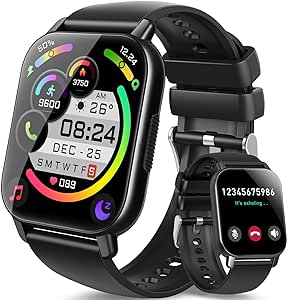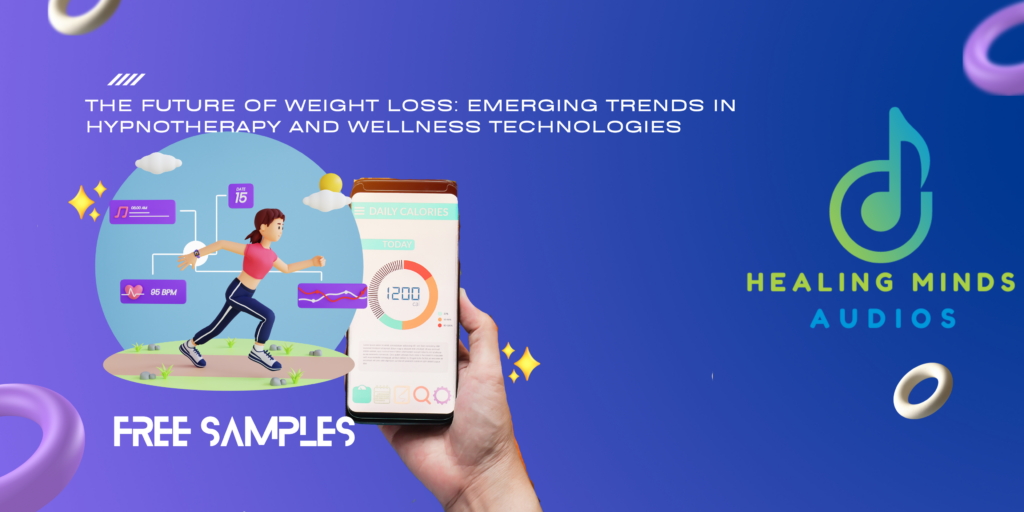No products in the basket.
Hypnotherapy
The Future of Weight Loss: Emerging Trends in Hypnotherapy and Wellness Technologies
The Future of Weight Loss
In the ever-evolving landscape of health and wellness, the quest for effective weight loss strategies remains a paramount concern for many. Traditionally, this journey has been dominated by diets, exercise regimes, and sheer willpower. However, as we delve deeper into the 21st century, an intriguing fusion is taking place at the intersection of psychological wellness and technological innovation. This fusion is redefining our approach to weight loss, with hypnotherapy emerging as a key player.
Hypnotherapy, long recognized for its potential to alter mindsets and behaviours, is undergoing a radical transformation. No longer confined to the therapist’s office, it’s now at the forefront of digital health revolutions. This metamorphosis is a response to a growing recognition: that weight loss is not just a physical challenge, but a psychological puzzle. The mind, with its deeply ingrained habits and emotional associations with food, plays a crucial role in the success or failure of any weight loss endeavour.
Today, we’re witnessing an unprecedented integration of hypnotherapy with cutting-edge technologies. From virtual reality (VR) that immerses individuals in controlled environments to artificial intelligence (AI) that personalizes therapeutic experiences, these advancements are breaking new ground. Moreover, with the advent of mobile applications and wearable technology, hypnotherapy is becoming more accessible and tailored than ever before.
The implications of this are profound. By leveraging technology, hypnotherapy can now offer more than just weight loss guidance; it provides a holistic, immersive experience that addresses the core psychological elements of eating and fitness habits. This integration promises a future where weight loss and wellness are not just about counting calories or steps but about understanding and reshaping the subconscious drivers behind our health choices.
As we embark on this exploration of the future of weight loss, it’s essential to recognise the potential of these emerging trends in hypnotherapy and wellness technologies. They are not just reshaping individual journeys but are also redefining the landscape of weight management as a whole.
The Evolution of Hypnotherapy in Weight Loss
The journey of hypnotherapy in the realm of weight loss is a tale of continual evolution and adaptation. Once perceived as a fringe element in the wellness industry, hypnotherapy has steadily gained credibility and prominence. This transition is rooted in a growing body of scientific research underscoring its effectiveness in modifying behaviours and mindsets central to weight management.
Initially, hypnotherapy in weight loss focused on direct suggestion techniques. Therapists would implant ideas and affirmations during sessions to encourage healthier eating habits and a more active lifestyle. While effective for some, this approach had its limitations, as it didn’t always address the deeper, underlying psychological factors influencing individuals’ relationships with food and exercise.
The real shift occurred with the introduction of cognitive-behavioural techniques in hypnotherapy. This blend, known as cognitive-behavioural hypnotherapy (CBH), offered a more holistic approach. It not only dealt with surface behaviours but also delved into the subconscious thought patterns and emotional triggers that often derail weight loss efforts. By reprogramming these deep-seated beliefs, CBH provided a more sustainable solution to weight loss, one that resonated with a broader audience.
Moreover, the rise of neuro-linguistic programming (NLP) within hypnotherapy brought further refinement. NLP techniques, focusing on the language and symbols the mind uses to interpret experience, added another layer of effectiveness. This approach helped individuals reframe their experiences and perceptions about food and exercise, fostering a more positive and proactive attitude toward weight management.
In recent years, the digital transformation has catapulted hypnotherapy into a new era. Online sessions, digital recordings, and interactive apps have democratised access, allowing individuals to engage with hypnotherapy from the comfort of their homes. This accessibility has not only expanded its reach but also opened the door to integrating other technological advancements, such as biofeedback and virtual reality, further enhancing its effectiveness.
The evolution of hypnotherapy in weight loss reflects a broader shift in our understanding of health and wellness. It underscores the acknowledgement that effective weight management is as much a mental and emotional journey as it is a physical one. As we continue to embrace and integrate new technologies, hypnotherapy stands poised to play an increasingly pivotal role in helping individuals achieve their weight loss goals.
Cutting-Edge Technologies Transforming Hypnotherapy
The integration of cutting-edge technologies in hypnotherapy marks a revolutionary turn in the realm of weight loss. These advancements are not just reshaping therapeutic techniques; they are redefining the entire experience, making it more effective, engaging, and personalised.
Virtual Reality (VR) and Augmented Reality (AR): These technologies are introducing an immersive dimension to hypnotherapy. By simulating real-world environments, VR and AR create controlled settings where individuals can confront and work through their food-related challenges in a safe, virtual space. This approach enhances the effectiveness of traditional hypnotherapy by providing a more tangible and relatable experience.
Artificial Intelligence (AI) and Machine Learning: AI’s role in personalizing hypnotherapy is groundbreaking. By analysing individual data, AI can tailor sessions to address specific behaviours and patterns unique to each person. This customisation ensures a more targeted and impactful therapeutic experience, increasing the likelihood of successful weight management.
Mobile Applications: The rise of hypnotherapy apps has brought this therapeutic method right into the user’s hands. These apps offer guided sessions, progress tracking, and even AI-driven personalisation, making hypnotherapy more accessible and adaptable to everyday life. They provide continuous support, helping users stay on track with their weight loss goals.
The synergy of these technologies with hypnotherapy is creating a new paradigm in weight loss strategies. By leveraging the power of immersive environments, personalized data, and widespread accessibility, these technological innovations are opening up new possibilities for effective and lasting weight management solutions.
The Synergy of Wearable Tech and Hypnotherapy
In the dynamic landscape of weight loss and wellness, the synergy between wearable technology and hypnotherapy represents a significant leap forward. This fusion brings together the precision of real-time biometric data with the transformative power of hypnotherapy, offering a comprehensive approach to weight management. 
Wearable technology, encompassing devices like smartwatches and fitness trackers, has revolutionised the way we monitor health. These gadgets track a range of data, from heart rate and sleep patterns to physical activity and calorie burn. When this wealth of information is integrated with hypnotherapy, it paves the way for highly personalised therapeutic interventions.
The real magic lies in the ability of these wearables to provide immediate feedback. For instance, a person might notice increased heart rate or stress levels at certain times of the day, potentially linked to unhealthy eating habits or emotional eating triggers. Hypnotherapy sessions can then be tailored to address these specific moments, using the data to focus on changing the behaviours and thought patterns that lead to these spikes.
Furthermore, wearables can assist in reinforcing the positive suggestions and behaviours encouraged during hypnotherapy. By setting reminders or alerts based on the goals established in therapy sessions, these devices can serve as constant companions in the journey towards a healthier lifestyle.
The integration of wearable technology with hypnotherapy goes beyond mere tracking; it offers a feedback loop that continually informs and enhances the therapeutic process. This combination is not just about collecting data; it’s about using that data to create a deeper, more meaningful understanding of an individual’s relationship with their body and health. It exemplifies the future of personalised healthcare, where technology and therapy converge to offer bespoke solutions for effective weight management.

